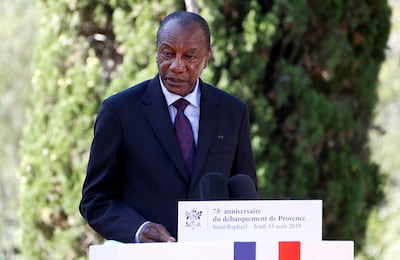Soldiers in Guinea on Sunday claimed they had detained the president and staged a coup, in the latest political upheaval to roil the impoverished west African country.
Guinean army Colonel Mamadi Doumbouya took control of state television and declared that President Alpha Conde’s government had been dissolved and the country’s borders had been closed.
Col Doumbouya sat draped in a Guinean flag flanked by a half dozen other soldiers in uniform as he read a statement, vowing: “The duty of a soldier is to save the country.”
“The personalisation of political life is over. We will no longer entrust politics to one man, we will entrust it to the people,” Col Doumbouya said, adding that the constitution would also be dissolved.
Col Doumbouya, who has headed a special forces unit in the military, said not enough economic progress had been made since the country became independent from France in 1958.
“If you see the state of our roads, if you see the state of our hospitals, you realize that after 72 years, it’s time to wake up,” he said. “We have to wake up.”
The mutinous soldiers vowed to restore democracy and gave themselves a name: The National Committee of Gathering and Development.
A video shared on social media and apparently taken by the soldiers showed a disheveled-looking Mr Conde, 83, sitting on a sofa, surrounded by troops. He refused to answer a question from one soldier about whether he was being mistreated.
It remained unclear whether Mr Conde and his allies remained in control of Guinea.
Mr Conde's government released a statement insisting that the attack on the presidential palace by special forces had been "repulsed".

UN Secretary General Antonio Guterres condemned Sunday's apparent coup, urging the putschists to release the president.
"I am personally following the situation in Guinea very closely. I strongly condemn any takeover of the government by force of the gun and call for the immediate release of President Alpha Conde," Mr Guterres tweeted.
Gunfire and troops on the streets
Local residents said they heard heavy gunfire ringing out over the capital Conakry on Sunday morning and saw troops on the streets.
"I see groups of soldiers heading towards the presidency. There has been a lot of shooting," said Ousmane Camara, a resident of the Kaloum Kaloum neighbourhood, which houses most of the ministries and the presidential palace.
Another resident, who did not want to be named, said he had seen a "column of military vehicles with excited soldiers" on board, driving towards the city centre.
"They were firing in the air and chanting their own military slogans," he added.
A Western diplomat in Conakry, who declined to be named, said the unrest started after the dismissal of a senior commander in the special forces – provoking some of its highly trained members to rebel and occupy the presidential palace.
Guinea has seen sustained economic growth during Mr Conde's decade in power thanks to its bauxite, iron ore, gold and diamond wealth, but few of its citizens have seen the benefits.
Opposition to Mr Conde's rule has mounted since he won a controversial third term in October by changing the constitution to allow him to stand again, despite violent protests from the opposition.
Mr Conde also survived an assassination attempt in 2011.
Critics say the government has used restrictive criminal laws to discourage dissent, while ethnic divisions and endemic graft have sharpened political rivalries.









